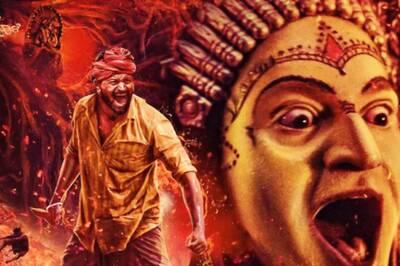
views
Director: Joshua Oppenheimer
Co-Directors: Christine Cynn and Anonymous
Producer: Signe Byrge Sorensen. Production: Final Cut for Real ApS
Executive Producers: Werner Herzog, Errol Morris, André Singer, Joram ten Brink
Two strange realizations surface within minutes of starting to view Joshua Oppenheimer's Academy Award nominated, once in a generation masterpiece, 'The Act Of Killing'. First, for a documentary that explores one of the greatest mass murders of the twentieth century - Indonesia's purge of alleged communists almost fifty years ago - the film is troublingly entertaining. Second, it appears that the films producers and the murderers they showcase, actually have the same objective: to revive the muted historical record of that massacre. This is no expose - the aging executioners speak over each other in their eagerness to let us know about their hard work and youthful enterprise that led to the deaths of up to three million Indonesians in 1965-66. Can we fault them for taking a little pleasure in their rote work? The Act Of Killing is at once mesmerizing and nausea inducing as it hurtles its viewers through a strange journey of genocide ethnography-meets-opera.
Early in the film is a bone-chilling sequence setting its tone: Anwar Congo a dark-skinned, lanky, flashily dressed septuagenarian, demonstrates for us how he murdered the enemy. On the rooftop of a low urban building in Medan, Sumatra, he ties a thin metal wire tied to a pole with the expertise of a boy scout, wraps it around his friend's neck and tugs gently. The real thing, he explains, would strangle someone quickly and almost bloodlessly. Anwar prides himself both as innovator and humanist - after all, he devised this less messy, more efficient way of killing.
He admits however, that he needs to drink and takes drugs to combat the recurrence of those murderous memories. Viewers should not be surprised if they begin to sympathize with this man - a self-declared, torturer and murderer who subsequently boasts on national television that he personally killed about a thousand people. We are susceptible to Anwar's undeniable charm and his peculiar on-screen sincerity even as we begin to realize the extent of his abhorrent past. A scene where he and his colleagues cruise down the memory lanes of their glory days is incredible in its candor. Driving around in a bright yellow retro-fitted vehicle, they excitedly narrate on film how they dumped bodies and killed people with bricks. The laughing we hear is real, not edited in.
Perhaps in an attempt to push this aspect of "re-entry" to 1965-66 without making it cinematically tedious, the filmmakers came up with a ploy whose simple persuasiveness can only be described as genius. They tell Anwar and his pals that together (murderers and well meaning documentarians) they would make a real movie that would reveal the actual details of what happened during darker times. Anwar, who fancies that he resembles Sidney Poitier, gleefully storyboards and plans the production. His vision is a mash-up of opera and high school theatre, moving from film-noir sets influenced by Hollywood gangster movies to outlandish outdoor productions, including a scene where donning an Imam's robe, he lip synchs to "Born Free."
But barring a few playful scenes, the re-enactments mostly tease out the harshest, ugliest, most brutal episodes of multiple murder and torture. Walking around in bizarre costumes - fedora's, religious attire and Medan-meets-Martin-Scorsese gangster clothing, the scenes do not lull, distance or wedge us into a meta-discussion of genocide. Make no mistake: young Anwar Congo was Kony on steroids.
But Anwar has a handicap that interferes with his work at times - his conscience acts up now and then. Once, acting as a victim and not an executioner on his own set, he almost has a nervous breakdown. When he asks Oppenheimer whether he will be judged for his crimes and looks visibly scared and possibly remorseful, I do not doubt that some viewers may have felt like consoling him.
Unlike Anwar however, his former partner-in-execution Adi Zulkardi is almost sage-like in his position on murder. Handsome and distinguished in an avuncular Javanese way, Adi explains his ethical precepts to Oppenheimer in a calm, philosophical manner that rivals Krishna from the Bhagavad Gita. Killing to him is merely a worldly affair and winners are the one's who adjudicate the moral high ground he contends. He reminds us that George Bush was never tried as a war criminal. One must heed to a higher calling of right and wrong and act. At Oppenheimer's egging he says that he is ready to take on any human rights commission - even The Hague should they wish to challenge him. We realize that Zulkardi is not calling anyone's bluff; beyond his ethical posturing, he is also well aware that the current Indonesian government would protect him.
But why would murderers living in a democracy wish to corroborate and even brag about the number of people they killed? This, we are made to realize, is the legacy of the aftermath of a still un-usurped brutal, dictatorial regime - The New Order, ushered in with a tacit nod from the CIA in 1966. Though officially ousted with the fall of General Suharto in 1998, it thrives through its strong connections to a hideous game of terror politics that started during the Cold War. The Pancasila Youth for example, Anwar Congo's former political base, a powerful paramilitary outfit responsible for horrific murders during that purge, is one of the groups that still flourishes and is still backed by former Indonesian Vice President Jusuf Kalla. Kalla makes a cameo appearance in the film during a rally and explains that such thugs or 'premans' have been historically valuable to the nation as they carry out the important, dirty work that the government cannot itself access.
And so these old men walk around scot free, if a little nostalgic, like movie stars whose golden days have passed them by. Although their associates and henchmen terrorize Medan, preying especially on Chinese shopkeepers in a mafia style bogus 'protection' scheme, it is clearly a fall from glamor. Anwar's bumbling, cross-dressing sidekick Herman Koto tries winning a local election and loses handily. Oppenheimer's movie production seems to be the best thing that happened to these retired murderers in a long time. And, oddly, to the hundreds of human rights activists who have been working tirelessly to raise the nations collective consciousness of the murders of 1965-66.
While it has been feted around the world, winning top prize at numerous festivals and discussed in critical essays by cultural heavyweights like Slavoj Zizek and Erol Morris (one of the films executive producers along with Werner Herzog), the film remains unreleased in Indonesia except via a free download made available by the filmmakers. In a recent, much delayed official response to the phenomenon of this film, Teuku Faizasyah the Indonesian President's spokesperson for foreign affairs slammed the film for promoting a 'negative image' of the country. "One must remember that the problem occurred in the context of the Cold War, a war against communism," he said. The films Indonesian co-director, credited as "Anonymous" responded via the Jakarta Globe, "A negative image is to make the architect of the mass killing a hero. A negative image is when there is an absence of efforts to start a true reconciliation process but instead displayed a fake reconciliation that basically contained a process to forget and made it as if it was the only possible way."
The film fortunately has been watched with cult like fervor in hundreds of unofficial venues. In an Al Jazeera reportage of this phenomenon in 2012, Anwar himself is recorded talking to the director after seeing the film for the first time. Oppenheimer tells him that his honesty and complicity was an important contribution to the history of the nation. They are both tearful. This is a tone that will no doubt keep recurring if a functional Truth and Reconciliation committee is actually set up in Indonesia. Online petitions are already in motion gathering thousands of signatures. The nation will have to haul in a line-up of dozens of Anwar's and set in motion what will surely become its harshest, gloomiest days of reckoning.
I expect The Act Of Killing to win an Academy Award on March 2nd. Even so, I doubt that we will ever find out the identity of the Indonesian co-director of the film. Such is the dark, lingering legacy of persecution.
Anwar Congo remains a free man.
Sandeep Ray is a filmmaker shuttling between Kolkata, Jakarta and Singapore. He can be reached at [email protected]



















Comments
0 comment